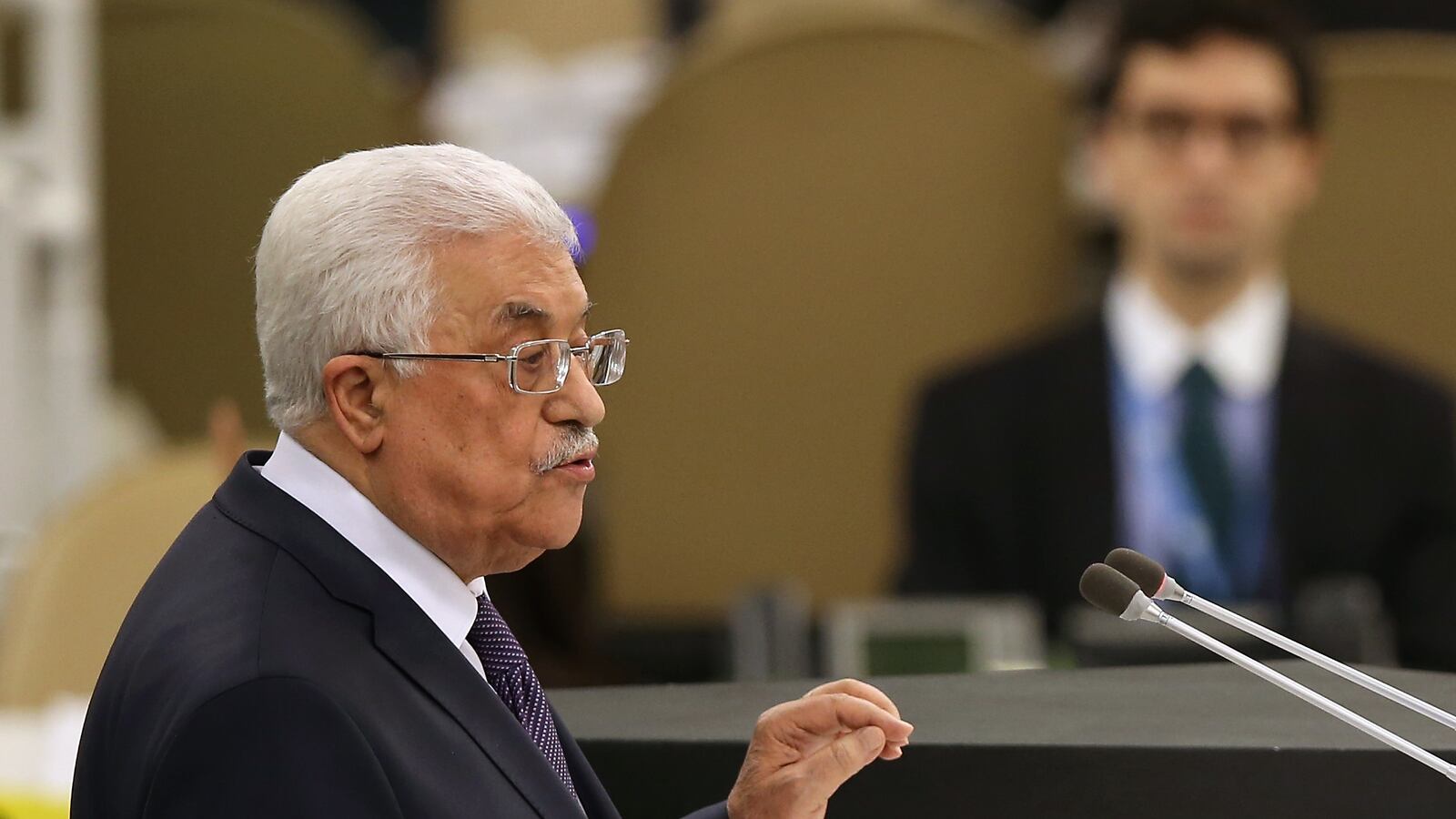Palestinian President Mahmoud Abbas delivered a moderate speech to the United Nations General Assembly on Thursday, a speech that contrasted sharply with the rhetoric of last year, when Palestine was urging that same body—successfully, it turned out—to raise its diplomatic status to that of an observer state.
But, listening closely, it was possible to hear in his speech hints at the issues that have been roiling beneath the surface of the recently renewed Israeli-Palestinian peace talks. That’s because Abbas—like Iranian President Hassan Rouhani before him—was doing double duty in his speech. He was delivering a message that was music to the ears of the international community, emphasizing that “the two peoples, the Palestinian and the Israeli, are partners in the task of peacemaking.” But he was also speaking to audiences back home, where concern over the current round of peace talks—and over his own ability to properly represent Palestinian interests there—has been mounting for weeks.

Finding a just solution to the plight of the Palestinian refugees is supposed to be one of the main features of the sought-after Israeli-Palestinian peace deal. But many Palestinians believe Abbas is too soft on the “right of return” issue. In an interview with Israeli Channel 2 last year, he effectively renounced his right to return to his hometown of Safed, saying, “It’s my right to see it, but not to live there.” That comment deeply alarmed Palestinians, who read it as a wholesale renunciation of U.N. resolution 194, where Palestinian refugees’ legal right of return is enshrined.
In Thursday’s speech, Abbas attempted to quell their fears. He insisted on “the resolution of the plight of Palestinian refugees in a just agreed upon solution, according to United Nations resolution 194, as called for by the Arab Peace Initiative.” He spoke of his own personal experience: “Like hundreds of thousands of Palestinian refugees, I have known as a youth the pain of exile [...] And we tasted in refugee camps in exile the bitter taste of poverty, hunger, illness and humiliation.” And, after mentioning Syria, he noted that “Palestinian refugees continue to pay—despite their neutrality—the price of conflict and instability in our region. Tens of thousands are forced to abandon their camps and to flee in another exodus searching for new places of exile.”
Abbas’s reassurances on this point were particularly important in light of a letter sent to him ahead of his U.N. speech by the Israel Policy Forum. In the letter, 100 American Jewish leaders urged him to publicly announce what he had reportedly told a private delegation from Israel’s Meretz party last month: that he was prepared to give up the right to return to Haifa, Acre, and Safed in the context of a peace deal. Making such an announcement at the U.N., it was argued, would help “improve the environment affecting the peace process.” In his speech, Abbas chose to go a different way.
The Palestinian president also gave voice to some of Ramallah’s frustrations over the way the current peace talks are being conducted. For weeks, Palestinian officials have been complaining to the press that the Israelis only want to discuss security issues, and that they are refusing to discuss borders until an agreement has been reached on the security arrangements in the future Palestinian state. So, when Abbas said in his speech that “what is required is to stop relying on exaggerated security pretexts and obsessions in order to consecrate occupation,” it was not hard to hear in his statement an echo of that same complaint.
Another complaint reported in the press over the past few weeks has to do with the level of involvement of the American mediators—special envoy Martin Indyk and his team—which the Palestinians deem insufficient. No great talent for reading political tea leaves was required to predict that Abbas would use his meetings with President Obama and Secretary of State Kerry, ahead of Thursday’s speech, to insist on greater U.S. involvement. That request seems to have been granted; on Tuesday, Obama reiterated his Administration’s commitment to facilitating the peace process, and on Wednesday, Kerry publicly stated that the U.S. role would be increased.
Still, Abbas took the opportunity of his U.N. speech to emphasize the role of the international community in ensuring the peace talks’ success. Criticizing Israel’s ongoing settlement construction and “settler terrorism,” he praised the European Union’s sanctions on settlement products as “a positive model of what is possible to be done in order to ensure an environment supportive of the negotiations and the peace process.”
Abbas’s speech did exactly what it needed to do. It sounded the moderate tones that the international audience wanted to hear. And it also addressed, however obliquely, the concerns of his Palestinian constituents back home.






